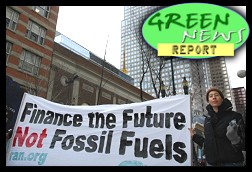
IN TODAY'S RADIO REPORT: Australia's record bushfires are out --- finally --- as new study warns they're going to get worse; Climate coverage by corporate news media still falling short; Tropical forests losing the ability to absorb carbon; PLUS: February 2020 was the second hottest February on record... All that and more in today's Green News Report!
Got comments, tips, love letters, hate mail? Drop us a line at GreenNews@BradBlog.com or right here at the comments link below. All GNRs are always archived at GreenNews.BradBlog.com.
IN 'GREEN NEWS EXTRA' (see links below): EU commission unveils climate law amid criticism; Backed by industry, five states seek to block natural gas bans; Ash and debris are choking Australia’s rivers; House lawmakers debate regulatory role of federal government in plastics and recycling... PLUS: Renewables, EV tax credits won't be included in Senate energy bill 'unless we have a miracle on the floor'... and much, MUCH more! ...
STORIES DISCUSSED ON TODAY'S 'GREEN NEWS REPORT'...
- February 2020 was the second warmest February on record:
- Surface air temperature for February 2020 (Copernicus)
- This winter in Europe was hottest on record by far, say scientists (Guardian UK)
- Moscow crushes record for warmest winter as milestones are set across Europe and North America (Washington Post)
- Winter 2019-20 Has So Far Been the Warmest on Record in the Contiguous U.S. (Weather Channel)
- Warmer months ahead for many parts of the planet: UN weather agency (WMO)
- January 2020: Earth’s Warmest January on Record (Scientific American)
- Climate coverage by corporate news media still short:
- How broadcast TV networks covered climate change in 2019 (Media Matters):
The volume of climate change coverage on the corporate broadcast nightly and Sunday morning news shows increased 68% from 2018 to 2019. Despite this increase, climate coverage as a whole still made up only 0.7% of overall corporate broadcast nightly and Sunday morning news shows in 2019. - PBS NewsHour significantly outperforms corporate broadcast nightly news shows in covering climate change (Media Matters)
- Australia's record bushfires are finally out, as new study warns they'll get worse:
- After more than 240 days, Australia's New South Wales is finally free from bushfires (CNN)
- Climate change made Australia’s devastating fire season 30% more likely (Nature):
The extreme fires that razed more than 18 million hectares of bush in Australia late last year were significantly more likely because of human-induced climate change, say an international group of climate scientists who have analysed the disaster. The researchers’ results, released today, suggest that human-induced climate change increased the risk of the weather conditions that drove the fires by at least 30%. - Bushfire crisis conditions eight times more likely under 2C warming, analysis shows (Guardian UK)
- Climate Change Affected Australia’s Wildfires, Scientists Confirm (NY Times):
Those values were extremely high, and were 30 percent more likely to be that high now than before 1900. Put another way, the researchers said, such high values are about four times more likely now than they were before. - VIDEO: How climate change helped fuel Australia's bushfires, w/ CBS Meteorlogist Jeff Berardelli (CBS News)
- Australia's summer of 2019-20 country's second-hottest on record (Guardian UK)
- Tropical forests losing ability to absorb carbon:
- Tropical forests losing their ability to absorb carbon, study finds (Guardian UK):
Amazon could turn into source of CO2 in atmosphere by next decade, research suggests. - Tropical forests' carbon sink is already rapidly weakening (Phys.org):
"One big concern for the future of humanity is when carbon-cycle feedbacks really kick in, with nature switching from slowing climate change to accelerating it. "After years of work deep in the Congo and Amazon rainforests we've found that one of the most worrying impacts of climate change has already begun. This is decades ahead of even the most pessimistic climate models. "There is no time to lose in terms of tackling climate change." - Wells Fargo Bank will no longer finance drilling projects in Arctic, ANWR:
- Wells Fargo Joins U.S. Banks Declining To Fund New Arctic Oil Projects (Oil Price):
Wells Fargo says that “Wells Fargo does not directly finance oil and gas projects in the Arctic region, including the Arctic National Wildlife Refuge (ANWR) – part of a larger 2018 risk-based decision to forego participation in any project-specific transaction in the region.”
'GREEN NEWS EXTRA' (Stuff we didn't have time for in today's audio report)...
For a comprehensive roundup of daily environmental news you can trust, see the Society of Environmental Journalists' Daily Headlines page
- EU commission unveils climate law amid criticism (AP)
- Greta Thunberg says EU is 'pretending' to tackle climate change crisis (ABC Australia)
- Backed by Industry, Several U.S. States Propose Blocking Cities from Banning Natural Gas (Reuters)
- How ash and debris are choking Australia’s rivers (Yale e360)
- Renewables, EV tax credits won't be included in Senate energy bill 'unless we have a miracle on the floor': Wyden (Utility Dive)
- House lawmakers debate regulatory role of federal government in plastics and recycling (Waste Dive)
- Saudi-Russia alliance under pressure at OPEC meeting, as coronavirus saps oil demand (CNBC)
- Fossil Corals Suggest a Mass Extinction Is on the Way: 'It's Like a Slow-Motion Car Crash' (Newsweek)
- Texas Grand Jury Rejects New Anti-Protest Law For Ship Channel Protesters (Reuters)
- California Had Its Driest February on Record. Here’s How Bad It Was. (NY Times)
- Chemical Industry Executive Nominated to Lead Consumer Watchdog Agency (NY Times)
- Trump Wants To Lift Ban On Moving LNG Gas On Trains. Critics Cite Risk. (Washington Post)
- What Does '12 Years to Act on Climate Change' (Now 11 Years) Really Mean? (Inside Climate News)
- VIDEO: A Message From the Future With Alexandria Ocasio-Cortez (The Intercept)
- SEJ Backgrounder: Green New Deal Proposes Sweeping Economic Transformation (Society of Environmental Journalists)
- Explainer: The 'Green New Deal': Mobilizing for a just, prosperous, and sustainable economy (New Consensus)
- What genuine, no-bullshit ambition on climate change would look like: How to hit the most stringent targets, with no loopholes. (David Roberts, Vox)
- A Global Shift To Sustainability Would Save Us $26 Trillion (Vox)
- Project Drawdown: 100 Solutions to Reverse Global Warming (Drawdown.org)
- An Optimist's Guide to Solving Climate Change and Saving the World (Vice)
- The great nutrient collapse: The atmosphere is literally changing the food we eat, for the worse. And almost nobody is paying attention. (Politico)
- The world's bleak climate situation, in 3 charts: We've got a long way to go and a short time to get there. (Vox)
- The Climate Risks We Face (NY Times):
To stabilize global temperature, net carbon dioxide emissions must be reduced to zero. The window of time is rapidly closing to reduce emissions and limit warming to no more than 3.6 degrees Fahrenheit or 2 degrees Celsius above preindustrial levels, the goal set in the Paris climate accord. The further we push the climate system beyond historical conditions, the greater the risks of potentially unforeseen and even catastrophic changes to the climate - so every reduction in emissions helps. - The Uninhabitable Earth: When will climate change make earth too hot for humans? (New York Magazine):
Famine, economic collapse, a sun that cooks us: What climate change could wreak - sooner than you think. - A beginner's guide to the debate over 100% renewable energy (Vox):
Clean-energy enthusiasts frequently claim that we can go bigger, that it's possible for the whole world to run on renewables - we merely lack the "political will." So, is it true? Do we know how get to an all-renewables system? Not yet. Not really.
FOR MORE on Climate Science and Climate Change, go to our Green News Report: Essential Background Page


 With Thanks, No Kings and Good Cheer
With Thanks, No Kings and Good Cheer Presidential Illegality and the Duty to Disobey
Presidential Illegality and the Duty to Disobey Sunday 'Leave 'em in Stitches' Toons
Sunday 'Leave 'em in Stitches' Toons President of United States Calls for Killing Democratic Officials: 'BradCast' 11/20/25
President of United States Calls for Killing Democratic Officials: 'BradCast' 11/20/25 'Green News Report' 11/20/25
'Green News Report' 11/20/25 Is MAGA Finally Beginning to Fall Apart?: 'BradCast' 11/19/25
Is MAGA Finally Beginning to Fall Apart?: 'BradCast' 11/19/25 Trump's Terrible, Horrible, No Good, Very Bad Day (Week? Month? Year? Life?): 'BradCast' 11/18/25
Trump's Terrible, Horrible, No Good, Very Bad Day (Week? Month? Year? Life?): 'BradCast' 11/18/25 'Green News Report' 11/18/25
'Green News Report' 11/18/25 A Kaleidoscope of Trump Corruption: 'BradCast' 11/17/25
A Kaleidoscope of Trump Corruption: 'BradCast' 11/17/25 Sunday 'Back to Business' Toons
Sunday 'Back to Business' Toons Trump DOJ Takes Stand for Voting Whites in CA: 'BradCast' 11/13/25
Trump DOJ Takes Stand for Voting Whites in CA: 'BradCast' 11/13/25 'Green News Report' 11/13/25
'Green News Report' 11/13/25 Mamdani's 'Surprisingly Affordable' Afford-ability Agenda for NYC: 'BradCast' 11/12
Mamdani's 'Surprisingly Affordable' Afford-ability Agenda for NYC: 'BradCast' 11/12 After the Shutdown and Before the Next One: 'BradCast' 11/11/25
After the Shutdown and Before the Next One: 'BradCast' 11/11/25 2025 Election Victories; Also: 7 Dems, 1 Indie End Shutdown: 'BradCast' 11/10/25
2025 Election Victories; Also: 7 Dems, 1 Indie End Shutdown: 'BradCast' 11/10/25 'We Can See Light at the End of the Tunnel' After Election 2025: 'BradCast' 11/6/25
'We Can See Light at the End of the Tunnel' After Election 2025: 'BradCast' 11/6/25 BLUE WAVE! Dems Win Everything Everywhere All at Once: 'BradCast' 11/5/25
BLUE WAVE! Dems Win Everything Everywhere All at Once: 'BradCast' 11/5/25 Repub Thuggery As Americans Vote: 'BradCast' 11/4/25
Repub Thuggery As Americans Vote: 'BradCast' 11/4/25 Last Call(s) Before Election Day 2025: 'BradCast' 11/3/25
Last Call(s) Before Election Day 2025: 'BradCast' 11/3/25 A Pretty Weak 'Strongman': 'BradCast' 10/30/25
A Pretty Weak 'Strongman': 'BradCast' 10/30/25
 VA GOP VOTER REG FRAUDSTER OFF HOOK
VA GOP VOTER REG FRAUDSTER OFF HOOK Criminal GOP Voter Registration Fraud Probe Expanding in VA
Criminal GOP Voter Registration Fraud Probe Expanding in VA DOJ PROBE SOUGHT AFTER VA ARREST
DOJ PROBE SOUGHT AFTER VA ARREST Arrest in VA: GOP Voter Reg Scandal Widens
Arrest in VA: GOP Voter Reg Scandal Widens ALL TOGETHER: ROVE, SPROUL, KOCHS, RNC
ALL TOGETHER: ROVE, SPROUL, KOCHS, RNC LATimes: RNC's 'Fired' Sproul Working for Repubs in 'as Many as 30 States'
LATimes: RNC's 'Fired' Sproul Working for Repubs in 'as Many as 30 States' 'Fired' Sproul Group 'Cloned', Still Working for Republicans in At Least 10 States
'Fired' Sproul Group 'Cloned', Still Working for Republicans in At Least 10 States FINALLY: FOX ON GOP REG FRAUD SCANDAL
FINALLY: FOX ON GOP REG FRAUD SCANDAL COLORADO FOLLOWS FLORIDA WITH GOP CRIMINAL INVESTIGATION
COLORADO FOLLOWS FLORIDA WITH GOP CRIMINAL INVESTIGATION CRIMINAL PROBE LAUNCHED INTO GOP VOTER REGISTRATION FRAUD SCANDAL IN FL
CRIMINAL PROBE LAUNCHED INTO GOP VOTER REGISTRATION FRAUD SCANDAL IN FL Brad Breaks PA Photo ID & GOP Registration Fraud Scandal News on Hartmann TV
Brad Breaks PA Photo ID & GOP Registration Fraud Scandal News on Hartmann TV  CAUGHT ON TAPE: COORDINATED NATIONWIDE GOP VOTER REG SCAM
CAUGHT ON TAPE: COORDINATED NATIONWIDE GOP VOTER REG SCAM CRIMINAL ELECTION FRAUD COMPLAINT FILED AGAINST GOP 'FRAUD' FIRM
CRIMINAL ELECTION FRAUD COMPLAINT FILED AGAINST GOP 'FRAUD' FIRM RICK SCOTT GETS ROLLED IN GOP REGISTRATION FRAUD SCANDAL
RICK SCOTT GETS ROLLED IN GOP REGISTRATION FRAUD SCANDAL VIDEO: Brad Breaks GOP Reg Fraud Scandal on Hartmann TV
VIDEO: Brad Breaks GOP Reg Fraud Scandal on Hartmann TV RNC FIRES NATIONAL VOTER REGISTRATION FIRM FOR FRAUD
RNC FIRES NATIONAL VOTER REGISTRATION FIRM FOR FRAUD EXCLUSIVE: Intvw w/ FL Official Who First Discovered GOP Reg Fraud
EXCLUSIVE: Intvw w/ FL Official Who First Discovered GOP Reg Fraud GOP REGISTRATION FRAUD FOUND IN FL
GOP REGISTRATION FRAUD FOUND IN FL








































